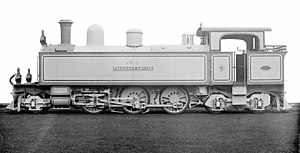South African Class D 2-6-4T

Pretoria-Pietersburg Railway no. 1 President Kruger,
CSAR Class D no. 209, SAR Class D no. 56 |
|||||||||||||||||||||||||||||||||||||||||||||||||||||||||||||||||||||||||||||||||||
|
|||||||||||||||||||||||||||||||||||||||||||||||||||||||||||||||||||||||||||||||||||
|
|||||||||||||||||||||||||||||||||||||||||||||||||||||||||||||||||||||||||||||||||||
|
|||||||||||||||||||||||||||||||||||||||||||||||||||||||||||||||||||||||||||||||||||
|
|||||||||||||||||||||||||||||||||||||||||||||||||||||||||||||||||||||||||||||||||||
| Type and origin | |
|---|---|
| Power type | Steam |
| Designer | Beyer, Peacock and Company |
| Builder | Beyer, Peacock and Company |
| Order number | 8210, 8491 |
| Serial number | 3943-3946, 3948, 4127 |
| Model | PPR 55 Tonner |
| Build date | 1897, 1900 |
| Total produced | 7 |
| Specifications | |
|---|---|
| Configuration: |
|
| • Whyte | 2-6-4T (Adriatic) |
| Driver | 2nd coupled axle |
| Gauge | 3 ft 6 in (1,067 mm) Cape gauge |
| Leading dia. | 30 in (762 mm) |
| Coupled dia. | 46 in (1,168 mm) |
| Trailing dia. | 30 in (762 mm) |
| Wheelbase | 28 ft 3 1⁄2 in (8,623 mm) |
| • Coupled | 10 ft 2 in (3,099 mm) |
| • Trailing | 5 ft 3 in (1,600 mm) |
| Length: |
|
| • Over couplers | 35 ft 6 3⁄4 in (10,839 mm) |
| Height | 12 ft 3 in (3,734 mm) |
| Frame type | Plate |
| Axle load | 11 LT 10 cwt (11,680 kg) |
| • Leading | 7 LT 15 cwt (7,874 kg) |
| • Coupled | 11 LT 10 cwt (11,680 kg) |
| • Trailing | 13 LT 5 cwt (13,460 kg) |
| Adhesive weight | 34 LT 10 cwt (35,050 kg) |
| Loco weight | 55 LT 10 cwt (56,390 kg) |
| Fuel type | Coal |
| Fuel capacity | 3 LT (3.0 t) |
| Water cap | 1,540 imp gal (7,000 l) |
| Firebox type | Belpaire |
| • Firegrate area | 16.8 sq ft (1.56 m2) |
| Boiler: |
|
| • Pitch | 6 ft 6 in (1,981 mm) |
| • Diameter | 4 ft 3⁄4 in (1,238 mm) |
| • Tube plates | 10 ft 3 11⁄16 in (3,142 mm) |
| • Small tubes | 185: 1 3⁄4 in (44 mm) |
| Boiler pressure | 170 psi (1,172 kPa) |
| Safety valve | Ramsbottom |
| Heating surface | 966.6 sq ft (89.80 m2) |
| • Tubes | 871.9 sq ft (81.00 m2) |
| • Firebox | 94.7 sq ft (8.80 m2) |
| Cylinders | Two |
| Cylinder size | 16 in (406 mm) bore 22 in (559 mm) stroke |
| Valve gear | Walschaerts |
| Valve type | Slide |
| Couplers | Johnston link-and-pin |
| Performance figures | |
|---|---|
| Tractive effort | 15,610 lbf (69.4 kN) @ 75% |
| Career | |
|---|---|
| Operators | Pretoria-Pietersburg Railway NZASM Imperial Military Railways Central South African Railways South African Railways |
| Class | PPR 55 Tonner CSAR & SAR Class D |
| Number in class | 6 |
| Numbers | PPR 1-6 CSAR 209-214 SAR 56-61 |
| Delivered | 1898, 1900 |
| First run | 1898 |
| Withdrawn | 1930 |
The South African Railways Class D 2-6-4T of 1898 was a steam locomotive from the pre-Union era in Transvaal.
Between 1898 and 1900, the Pretoria-Pietersburg Railway placed six 55 Tonner 2-6-4T Adriatic type tank steam locomotives in service. During the Second Boer War, the Transvaal government took possession of the railway and it was operated as part of the Nederlandsche-Zuid-Afrikaansche Spoorweg-Maatschappij, until the Imperial Military Railways took over all railway operations in the Zuid-Afrikaansche Republiek.
At the end of the war, these locomotives were taken onto the roster of the Central South African Railways, renumbered and designated Class D. In 1912, when these engines were assimilated into the South African Railways, they were renumbered once again, but retained their Class D classification.
The Pretoria-Pietersburg Railway (PPR) was a private railway which operated between Pretoria West via Warmbad and Nylstroom to Pietersburg. It was constructed under a concession granted by the government of the Zuid-Afrikaansche Republiek (ZAR) to Hendrik Jacobus Schoeman on 30 October 1895. Construction commenced in 1897 and the railway was opened to traffic as far as Nylstroom by 1 July 1898. Potgietersrus was reached on 1 October 1898 and Pietersburg on 1 May 1899.
In 1897, the PPR ordered six 2-6-4T Adriatic type tank locomotives from Beyer, Peacock and Company. At the time, these locomotives were amongst the most advanced designs yet to be seen in South Africa.
The locomotives were the first in South Africa to be equipped with Belpaire fireboxes. The cylinders were arranged outside the plate frames, while the valves were arranged above the cylinders and actuated by Walschaerts valve gear.
Five of the six locomotives were delivered to the PPR in 1898. They were to be numbered in the range from 1 to 6, but no. 5 was lost at sea. No. 6 was therefore renumbered to no. 5 to rectify the gap in the numbering sequence and a replacement for the lost locomotive was ordered from Beyer, Peacock.
...
Wikipedia
